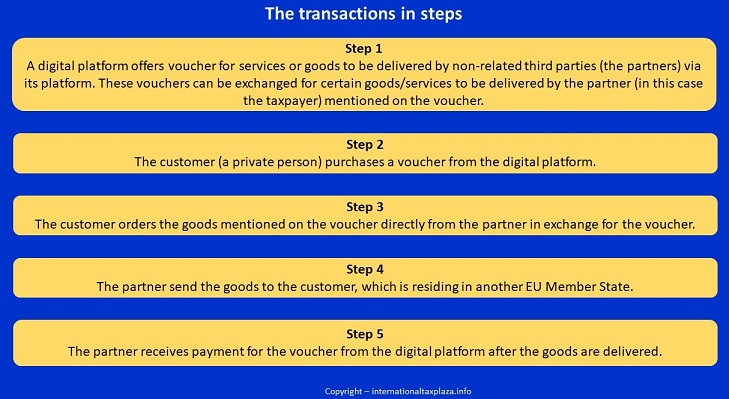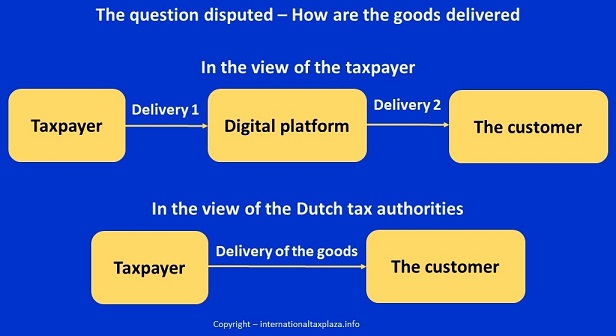On March 30, 2022, on the website of the Dutch courts (De Rechtspraak) a very interesting judgment of the Court of Appeal of Amsterdam in the joined Cases 20/00052 and 20/00053, ECLI:NL:GHAMS:2022:716, was published. The judgment already dates from January 4, 2022, but it was only published on the website of the Dutch courts on March 30, 2022.
The question that the court has to answer is whether in the underlying case VAT is due by the taxpayer over goods delivered.
Facts of the underlying case
The taxpayer is an entrepreneur for VAT purposes. The main activities of the taxpayer is the sale of jewlery and diamonds.
The taxpayer is a resident of in the Netherlands. The goods are delivered from the warehouse in the Netherlands and the transport of the goods carried out on behalf of the taxpayer by a courier company that is owned by the taxpayer’s brother.
The goods are delivered to customers that are residents of the Netherlands, other EU Member States and countries from outside the EU.
The sale of the goods partly takes place via the digital platform [A]. For this the taxpayer has entered into agreements with various branches of [A] which are located in other EU Member States. A large number of products and services are offered via [A]'s websites. [A]'s services consist of placing advertisements, performing publicity activities and collecting the purchase amounts; in short, offering a platform via which, among other things, the products offered by the taxpayer can be offered to customers.
During the period in question (2011-2013), a customer who wishes to obtain a product or a service from the taxpayer purchases a voucher from [A] for this purpose. These concern [A] Vouchers. When purchasing such voucher the customer is aware that this voucher can be exchanged for a specific product as determined when purchasing the voucher. The customer pays [A] for the purchase of the voucher. If the customer wants a product, he turns to the taxpayer and exchanges the voucher with him and obtains the respective product. The taxpayer then transfers the voucher to [A]. After a deduction of a fee for the services [A] rendered to the taxpayer, [A] pays the amount received from the customer to the taxpayer.

The consumer can only exchange the voucher with the relevant partner during the agreed term. If the consumer allows the validity period to expire unused, he is not entitled to a refund.
The general terms and conditions as published in 2011 on the Dutch website of [A] include the following.
“1. On the website www.[A].nl of [A] vouchers for services or for goods of other companies (the partners) are offered. The issuer of the vouchers and the debtor of the services or goods as specified in the vouchers are only the partners specified in each case, who provide these services or goods on the basis of their respective General Terms and Conditions. [A] itself is not obliged to provide the services stated in the vouchers or the delivery of the indicated goods, but only undertakes that the voucher entitles you to the provision of the service by the partner if paid to the provisions of these General Terms and Conditions. (…)”
The general terms and conditions that [A] uses in the various countries such as Germany and Great Britain do not differ in substance on this point.
The agreements describe which goods the taxpayer will supply to voucher holders and furthermore state that [A] will offer the vouchers for the relevant goods of the partner on its website in accordance with its General Terms and Conditions. For example, the General Terms & Conditions of [A] Co-operation Agreements of MyCityDeal Ltd (t/a [A] UK) contain the following provisions:
“1.2 [A] shall use its reasonable endeavors to sell Vouchers on [A] ’s own behalf to Purchasers through the [A] website. (…)”
and:
“2.1 Partner and [A] understand and agree that: (…) (ii) Partner (as opposed to [A] ) shall provide, and shall be solely responsible to provide, the Voucher Services to Purchasers.”
and:
“4.1 [A] shall collect and retain the [A] Voucher Price as payment for a Voucher sold to a Purchaser.
“4.2 For any Voucher that is Validly Redeemed by a Purchaser with Partner, [A] shall pay to Partner the [A] Voucher Price less the Success Fee (…). (…)”
In the General Terms and conditions tot he agreements that the taxpayer concluded with [A] a.o. the following is mentioned:
“The Partner (Court of Appeal: the taxpayer) shall provide the following “ Voucherservices ” to customers who purchase a [A] voucher (….). [A] shall promote Vouchers on the [A] website.
(…)
6 Warranty/indemnity
(…)
6.3. Partner shall indemnify and hold harmless [A] (…) from and against any and all claims (…) out of or in connection with any claim or suit of demand: (i) by a Purchaser (…); (ii) in respect of, arising out of, or in connection with a Voucher (…).
(…)”
The dispute
The taxpayer and the tax authorities are disputing whether VAT is due by the taxpayer over the supplies of goods involving the [A] branches in other EU countries and private customers residing there. More specifically parties are disputing to whom the taxpayer delivers the goods, or, by extension, who is to be considered to be the supplier of the goods to the private customers resident in other EU Member States: [A] or the taxpayer?

From the considerations of the court
In order to answer the question to whom the subject goods have been delivered, the legal relationships – both the mutual (that between [A] and the taxpayer) and those with third parties (the one between [A] and the consumer and that between the taxpayer and the consumer) – are important. It must be deduced from what has been laid down in this regard what the parties involved have agreed and to whom the taxpayer has transferred the power to dispose of the goods as owner. In that respect in addition to the agreements between the taxpayer and [A], the General Terms and Conditions of [A] must be taken into account, since these General terms and Conditions may also contain indications for the answer to the question of what has been agreed between the parties involved.
From the General Terms and Conditions it follows that the consumer concludes two agreements: one with the voucher seller [A] regarding the voucher and one with the supplier/partner (the taxpayer) regarding the service or product. In this context, the Court refers to the phrase: 'The issuer of the vouchers and the debtor of the services or goods indicated in the vouchers are only the (...) partners'. This phrase, among other things, leaves no room for misunderstandings regarding the answer to the question who is the supplier of the goods. The fact that [A] is obliged to provide the voucher and to do everything necessary to enable the customer to exercise the ensuing property right does not alter this. This interpretation of the legal relationships is supported by the circumstance that in the event of default by the partner (the taxpayer), [A] disclaims all liability.
This interpretation of the agreements made is also supported by the agreements that partners (such as the taxpayer) have concluded with [A] . According to that agreement, it concerns the providing of 'voucher services' and not the delivery of goods. That agreement also clearly states that the partner (the taxpayer) is obliged to deliver the goods to the consumer and that partner (the taxpayer) and not [A] is responsible for the sale and settlement of claims arising from the agreement between him and the consumer.
In view of the mutually related contract conditions, the Court is of the opinion that [A] offers the taxpayer a marketing platform, a meeting place where sellers and consumers can negotiate and conclude transactions. In that context, [A] fulfills the role of intermediary and not that of buyer or supplier of the products/services offered on that platform. The fact that [A] manages the cash flows associated with the voucher system it uses does not alter this. After all, the legal relationships that have been established are decisive in this regard. The taxpayer has rightly argued that it will not be paid in cases where the vouchers are not exchanged (in a timely matter). But in those cases it also did not deliver any goods, so that such situations did not influence the (amount of) the additional (VAT) assessments that are being contested.

It then remains to be determined whether the supplies of goods were also made for in return for a consideration, which the taxpayer disputes. According to settled case-law, for that there must be a direct link between the goods delivered and the consideration received, without it being required that the consideration is directly received from the person for whom the supply of goods is intended. In the underlying case, it is established that the exchange of the vouchers results in [A] making payments to the taxpayer and it is moreover plausible that the taxpayer only makes the deliveries in the knowledge that it will receive payment from [A]. This does not alter the fact that the taxpayer must first claim those payments from [A] . The payments the taxpayer receives from [A], increased with the fees that [A] deducts therefrom for its services, therefore constitute the consideration for which the taxpayer made its supply of goods (conform ECJ 7 October 2010, Loyalty Management UK and Baxi Group, C -53/09 and C-55/09, ECLI:EU:C:2010:590, paragraphs 58-60). Since the customers of the taxpayer are individuals (and therefore not entrepreneurs) who are residing in other Member States, the application of the zero rate does not apply to the supplies in question.
Unlike the taxpayer, the Court of Appeal does not read in the gift card decision (het cadeaubonnenbesluit) that the entrepreneur from whom an [A] voucher is exchanged does not owe VAT on the exchange. It cannot – a contrario – be inferred from the position that VAT is due when exchanging value vouchers (waardebonnen), that this is not the case when vouchers that are not value vouchers are exchanged. Furthermore, [A]'s vouchers are not discount coupons, because they do not entitle the consumer to a discount, but to a specific good.
The conclusion of the above is that VAT is due by the taxpayer over the payments the taxpayer receives from [A], increased with the fees that [A] deducts therefrom for its services.
The taxpayer also argued: “The tax authorities have unjustly and incorrectly informed the German tax authorities and, as it now appears, also the governments of the United Kingdom, Spain, Italy and Sweden.” If and insofar as the taxpayer wishes the Court to rule on the lawfulness of that exchange, the Court considers that it is not competent to do so, with reference to the provisions of Article 26 of the Algemene wet inzake rijksbelastingen (the General State Taxes Act).
Copyright – internationaltaxplaza.info
and